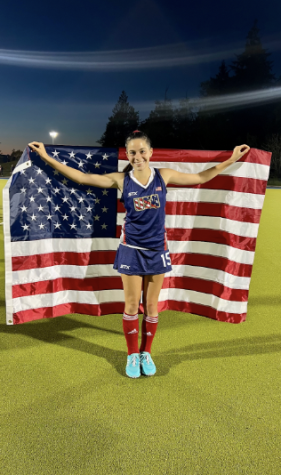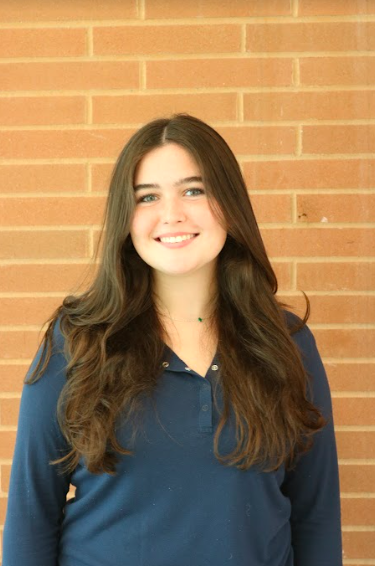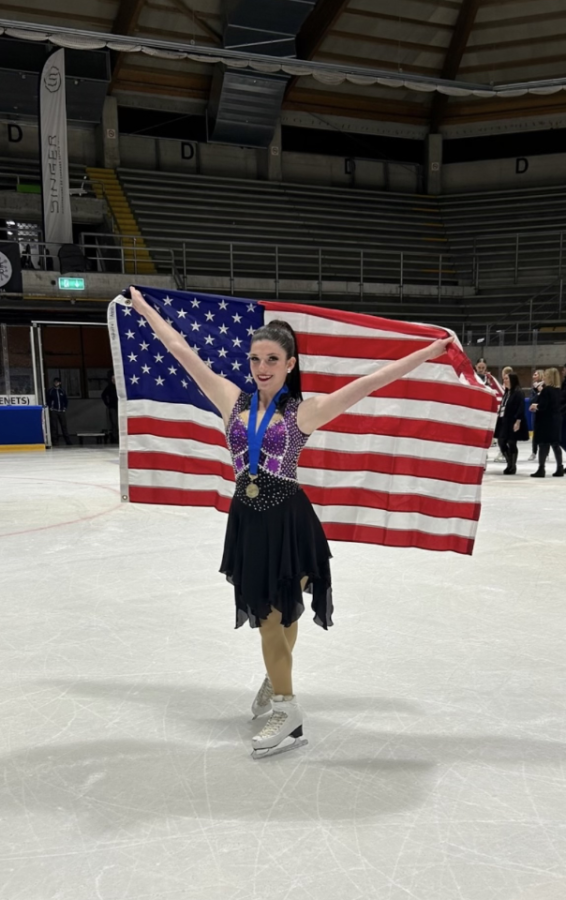Team USA competitors juggle athletic, academic pursuits
Photo contributed by Sam Paris ’23.
Sam Paris ’23 represents Team USA as a Skyliner Senior Synchronized Skater.
Three math problems left. Five minutes until the performance. She frantically continues with her worksheet, eager to get it done before the other team finishes its routine. One problem left. The music begins to fade. She rapidly finishes the last problem. Done. Sam Paris ’23 takes a deep breath and confidently steps out onto the ice, ready for her first competition as a Team USA synchronized skater.
For those who earn a spot to compete for Team USA, the challenge of balancing athletic pursuits with academic responsibilities can be particularly daunting. These competitors must navigate the demanding training hours, rigorous competition schedules and long travel times, all while staying on top of their school work.
“After long days of competition, […] while many of my teammates are out celebrating their wins,” WKC Team USA Kata competitor Logan Goodman ’24 said, “I am in my room catching up with the lessons I missed that day in class.”
Goodman regularly trains for roughly two to three hours a day, six days a week. When competing, she sometimes misses up to a week of school because of traveling.
The challenge of balancing athletics and academics is particularly important for teen athletes who represent Team USA, as they have to maintain a high level of performance and achievement in both areas. This requires a lot of planning, support and flexibility from their coaches, teachers and parents. They also need a deep commitment to their goals and a willingness to prioritize and make sacrifices.
According to Natalie Chudowsky ’26, a midfielder for the U.S. Under-15 Girls’ National Soccer Team, and Sofia Fidalgo Schioppa ’25, a center-midfielder on the U.S. Under-16 National Field Hockey Team, one of the key strategies is staying organized.
“Time management is very important,” Chudowsky said. “I value both my athletics and academics highly. Learning to have a balance of both has been a skill that I have gained over time.”
Both Chudowsky and Schioppa are accomplished athletes, who manage their academic commitments alongside their athletic pursuits. For them, time management and organizational skills are the keys to success. As Chudowsky emphasized the importance of balance between athletics and academics, Fidalgo echoed similar thoughts, adding that it’s not always easy to manage everything, but the hard work is worth it in the end.

“It’s hard to fit it all,” Fidalgo said. “But it comes down to organization and knowing how much you can handle. Sometimes my schedule is a continuous cycle of no breaks, but it’s worth it because I’m doing what I love.”
Each of these athletes acknowledges that the true value of their academic sacrifices lies in the opportunity to perform the sport they are passionate about at the most elite level in the nation.
Skyliners Senior Synchronized Skater Sam Paris represented Team USA last year during the competition season. Over the weekend, she spends a total of 17 hours preparing for the competition with the team and she practices alone before school almost every morning.
Since November, Paris has missed two weeks of school every month for competitions. Due to the demanding practice and competition schedules, she has sacrificed memorable moments of her senior experience for time on the ice.
“I’ve missed a couple dances, early mornings, skip days,” Paris said. “I just got back from a month of missed school to find I missed Officer Ed getting pied in the face and a car getting driven into the school: both events were crazy but brought the community together, so it’s a little sad I missed them.”
For these athletes, the sacrifices they make for their passions is beyond gratifying. Despite missing out on events and experiences, and having to work twice as hard to catch up on their schoolwork, they wouldn’t trade their dedication to their sports for anything.
“Karate is my passion; it’s my escape, and I can’t imagine my life without it,” Goodman said. “I don’t think of karate, or training, as something I need to check off each day; I think of it as a privilege that I get to spend time doing something I love.”

Editor-in-Chief Paige Tighe ’24 loves connecting with her community – even if that community is made up of elementary schoolers. As a summer camp counselor,...
























































